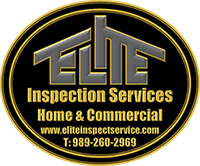Did you know that Michigan is one of only 14 states that doesn’t require a license to perform your home inspection? It begs to question, how can you be sure your inspector would know when he/she is looking at potential health hazards such as asbestos insulation or tile, vermicular attic insulation or likely lead based paint? Do you know if he or she was professionally trained in how to thoroughly test a septic system that could otherwise cost you thousands of dollars to repair or replace once you move into your new home? Do they know how to test your water well to ensure that its functioning properly and producing satisfactory yields and pressures?
Ideally we’d have a state license would require the inspector to complete the rigorous training and education to pass a state exam.
So how do you to protect yourself when choosing a home inspector in Michigan? You can select a Professionally Certified Inspector that has been trained and passed an exam! There are a few different professional home inspection organizations that issue professional certification; (interNACHI, ASHI, ICA, AHIT.) Each of these organizations have a set of educational standards that must be met to acquire their certification.
Here are three major reasons why this is critical when choosing an inspector:
- It verifies that your inspector is fully educated and met a professional inspection organization’s stringent requirement to obtain certification. It also confirms that the inspector has passed a professional examination. And it means that they are enrolled in continuous education program to keep abreast of the latest standards and practices in the home inspection profession.
- It means that your inspector abides by a professional Code of Ethics. This entails;
- The inspector shall adhere the Certification Organization’s “Standards of Practice,” (refers to a set of guidelines established by the organization that outlines the minimum requirements for performing a home inspection, detailing which systems and components a home inspector must examine during a visual inspection of a residential property.)
- There is no conflict of interest between the inspector and the realtor/buyer/seller. The inspector is working ONLY on behalf of the client purchasing the inspection.
- The inspector is forthright in communicating their qualifications/certifications without embellishment. (Cannot display the seal without acquiring certification.)
- The inspector shall annually meet/exceed the certification requirements including continuous education.
- The inspector is a business professional. This means the inspector carries and displays their certification ID and ID number. The inspector carries professional liability insurance. The inspector conducts business using a professional agreement/contract. And the inspector produces an inspection report meeting or exceeding the minimum standards of practice.
So how do you know if your inspector is certified? There’s a few different ways you can confirm that you inspector is certified.
First, you can search the nation’s largest inspector database, (interNACHI) to find a certified inspector or confirm that your inspector is certified.
Here’s the link;
https://www.nachi.org/certified-inspectors
Second, you can check their website to see if they have a home inspector certificate ID# available. Like this:
- Member – ICA (Inspection Certification Association) ID: #24668
- Member – InterNACHI member ID: #NACHI20112309
Lastly, I urge you to do your own research and confirm that you have selected a reputable and certified home inspector. Not just because it’s a wise investment, most importantly because it protects you the buyer from paying for an uneducated and unprofessional inspector. You need to know that you’re hiring a certified professional, fully trained and educated with the latest information, insured and dedicated to providing you with a thorough inspection report that meets and/or exceeds the minimum standards of practice.
